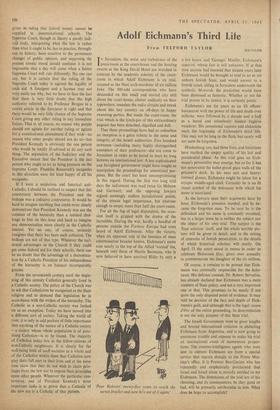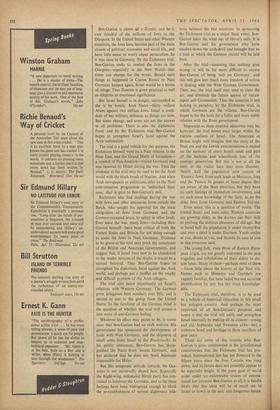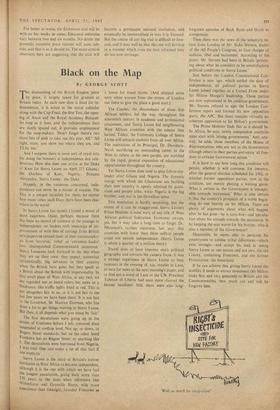Adolf Eichmann's Third Life
From TELFORD TAYLOR 117121:SALEIN IN Jerusalem, the noise and turbulence of the press-room at the court-house and the buzzing swarm at the King David Hotel are matched in contrast by the academic sobriety of the court- room in which Adolf Eichmann is on trial, accused as the Nazi arch-murderer of six million Jews. The 500-odd correspondents who have descended on this small and storied city mill about the court-house, chatter endlessly on their typewriters, inundate the radio circuits and streak about this tiny country on off-days in happy swanning parties. But inside the court-room, the trial which is the lynch-pin of this extraordinary pageant has been detached, dignified and dull.
That these proceedings have had so colourless an inception is a great tribute to the sense and integrity of the Israeli authorities. Five hundred newsmen—including many highly distinguished exemplars of their profession—did not come to Jerusalem in order to be bored to tears by long lectures on international law. A less sophisticated and farsighted government might have sought to manipulate the proceedings for sensational pur- poses. But the court has been uncompromising in this regard. During the first two long trial days the indictment was read twice (in Hebrew and German); and the opposing lawyers argued seemingly endless jurisdictional points, of the utmost legal importance, but abstruse enough to empty more than half the court-room.
For all the fog of legal disputation, the occa- sion itself is gripped with the drama of the incredible. During the war, hardly a handful of persons outside the Fortress Europa had even heard of Adolf Eichmann. After the victory, when nis apparent role in the business of mass extermination became known, Eichmann's name rose nearly to the top of the Allied 'wanted' list, beneath only those of Martin Bormann, who is now believed to have survived Hitler by only a 'Poor Roberts! twenty-five years to reach the surtax bracket and now he's out of it again.' a few hours, and 'Gestapo' Mueller, Eichmann's superior, whose fate is still unknown. If at that time anyone had foretold that sixteen years later Eichmann would be brought to trial in an as yet unborn Jewish State, and would answer to a Jewish court, sitting in Jerusalem underneath the symbolic Menorah, the prediction would have been dismissed as fantastic. Whether or not his trial proves to be justice, it is certainly poetic.
Eichmann's ten fat years as an SS officer- bureaucrat with the power of life and death over millions, were followed by a decade and a half as a hated and relentlessly hunted fugitive wanderer. His sensational capture and abduction mark the beginning of Eichmann's third life. This may not be long in the flesh, but surely will not soon be forgotten.
Hindenburg, too, had three lives, and historians have marked the empty quality of his last and presidential phase. As this trial goes on Eich- mann's personality may emerge, but so far it has not penetrated the bullet-proof glass walls of the prisoner's dock. In his neat suit and heavy- rimmed glasses, Eichmann might be taken for a myopic middle-aged clerk. Certainly he is no fit visual symbol of the holocaust with which his name is associated.
As the lawyers spun their arguments hour by hour, Eichmann's presence receded, and he be- came the forgotten man. To be sure he is the defendant and his name is constantly mouthed, but in a larger sense he is neither the subject nor the object of his own trial. The subject is the 'final solution' itself, and the whole terrible pic- ture will be given in detail, and in the setting of centuries of Jewish persecution, to the details of which historical scholars will testify. On April 13 the court stood in recess, in order to celebrate Holocaust Day, given over annually to commemorate the slaughter of the six million.
Of course, it remains to be proved that Eich- mann was criminally responsible for the •holo- caust, His defence counsel, Dr. Robert Servatius, has already declared that Eichmann was a• mere creature of State policy, and not a very important one at that. This promises to be nearly if not quite the only disputed point of evidence. It may well be decisive of the fact and depth of Eich- mann's guilt, and although that is the legal raison d'être of the entire proceeding, its determination is not the only purpose of this State trial.
The Israeli Government went to great lengths and braved international criticism in abducting Eichmann from Argentina, and is now going to enormous trouble and expense to make his trial an international event of momentous propor- tions. The counter-intelligence agents who were sent to capture Eichmann are from a special service that reports directly to the Prime Min- ister's office. It is Premier Ben-Gurion who has repeatedly and emphatically proclaimed that Israel and Israel alone is morally entitled to try Eichmann. The dimensions of the trial arc of his choosing, and its consequences, be they good or bad, will be primarily attributable to him. What does he hope to accomplish? Ben-Gurion is above all a Zionist, and he is ever mindful of the millions of Jews in the Diaspora. In the United States and other Western countries, the Jews have become part of the main stream of political, economic and social life, and have little cause to worry about persecution. So it was once in Germany. By the Eichmann trial, Ben-Gurion seeks to remind the Jews in the Diaspora—especially in the New World—that times can change for the worse. Should such things as happened in Czarist Russia or Nazi Germany happen again, Israel would be a haven of refuge. Thus Zionism is given practical as well as religious or emotional significance.
But Israel herself is in danger, surrounded as she is by hostile Arab States—thirty million Arabs against two million Jews. Israel is confi- dent of her military defences as things are now. But times change, and arms are not the answer to all problems. There is also the diplomatic front, and by the Eichmann trial Ben-Gurion hopes to strengthen Israel's hand against the Arab nationalists.
The trial is a good vehicle for this purpose, for Eichmann himself went on a Nazi mission to the Near East, and the Grand Mufti of Jerusalem— a symbol of Pan-Arabism—visited Germany and was received by Hitler during the war. Thus the evidence at the trial may be used to tar the Arab world with the black brush of Nazism. And when Arab newspapers or politicians refer to the Nazi extermination programme as 'unfinished busi- ness,' that is grist to Ben-Gurion's mill.
Eichmann also had dealings during the war with Jews and other emissaries from outside the Reich, who sought his approval for the mass emigration of Jews from Germany and the German-occupied areas, to safety in other lands. Ever since the war, many Jews—including Ben- Gurion himself—have been critical of both the United States and Britain for not doing enough to assist the Jews in Nazi Germany. Evidence to be given at the trial may prick the conscience of the British and American Governments, and suggest that, if Israel were now to be abandoned to the tender mercies of the Arabs, it would be a second betrayal. Thus Ben-Gurion hopes to strengthen his diplomatic hand against the Arab world, and perhaps put a muffler on the touchy and difficult problem of the Arab refugees.
The trial also bears importantly on Israel's relations with Western Germany. The German press delegation here numbers over fifty, and is second in size to the group from the United States. In the forefront of the German mind is the question of whether the trial will arouse a new wave of anti-German feeling.
Whatever its effect may prove to be, it seems clear that Ben-Gurion had no such motives. His government has sponsored the development of trade with West Germany, and the shipment of small arms from Israel to the Bundeswehr. In his public utterances, Ben-Gurion has distin- guished the Nazis from 'decent Germans,' and has declared that he does not 'hold Adenauer responsible for Hitler.'
But this temperate attitude towards the Ger- mans is not universally shared here. Especially the Right-wing, nationalist Herut party has con- tinued to belabour the Germans, and so far these feelings have been widespread enough to block the re-establishment of normal diplomatic rela-
tions between the two countries. In sponsoring the Eichmann trial as a major State event, Ben- Gurion takes the wind out of Herut's sails. It is Ben-Gurion and his government who have tracked down the arch-devil and brought him to a trial at which the German record will be laid bare.
After the trial—assuming that nothing goes wrong---it will be far more difficult to accuse Ben-Gurion of being 'soft on Germany,' and this will give him much more freedom of action in dealing with the West German Government. Then, too, the trial itself may tend to clear the air, and diminish the future appeal of intran- sigent anti-Germanism. Thus the situation is not lacking in paradox; by the Eichmann trial, in which Germans are the villains. Ben-Gurion hopes to lay the basis for a fuller and more stable relation with the Bonn government.
Important as these external objectives may be, however, the trial looms even larger within the narrow confines of Israel. The American or Briton might well imagine that the story of the Nazi era and the Jewish exterminations is etched on the memory of every Israeli adult and part -younger the bedtime and schoolbook lore of the younger generation. But this is not at all the case, as the visitor here may soon discover. Nearly half the population now consist of 'Eastern' Jews, from such lands as Morocco, Iraq and the Yemen. In greater or lesser degree they are aware of the Nazi atrocities, but they have no such feelings of immediate involvement, and no such close knowledge of the facts, as do the older Jews from Germany and Eastern Europe.
Even more, this is a question of youth. The United States and most other Western countries are growing older, as the doctors use their skill to prolong the dubious pleasures of old age. But in Israel half the population is under twenty-five and over a third is under fourteen. Youth smiles at you, shouts at you, and thumbs its nose at you in this vivacious land.
The young folk, even those of Eastern Euro- pean origin, are not greatly interested in the past tragedies and tribulations of their elders in dis- tant lands. Many of them—perhaps most of them —know little about the history of the Nazi era. Names such as Himmler and Goebbels are vaguely familiar, but have faded beyond accurate identification by any but the most knowledge- able.
The Eichmann trial, therefore, is to be used as a vehicle of historical education in this small but polyglot country. And perhaps the most important of all Ben-Gurion's purposes and hopes is that the trial will unify and strengthen Israel internally by making all its citizens—young and old, Sephardic and Yemenite alike—feel a common bond and heritage in these sacrifices of past years These are some of the reasons why Ben- Gurion is quite uninterested in the jurisdictional controversies that the Eichmann trial has pro- voked. International law has not flowered in the fifteen years since the Iron Curtain was rung down. and its future does not presently appear to be especially bright. If the great goal of world order under an enforceable system of interna- tional law interests Ben-Gurion at all, it is hardly likely that this ideal will be of much use to Israel or Jewry in the near and dangerous future. For better or worse, the Eichmann trial will be with us for weeks to come. Educated estimates vary between two and six months. No doubt the presently excessive press interest will soon sub- side, and that is as it should-be. The more cynical observers, here are suggesting that the trial will become a permanent national institution, and eventually be immortalised in wax d la Tussaud. But the course of any big trial is difficult to fore- cast, and it may well be that this one will develop in a manner which even the best informed here do not now envisage.
















































 Previous page
Previous page